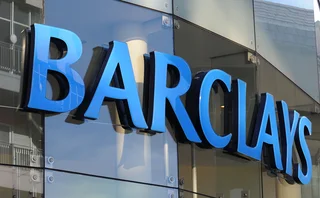

Bleak macro view pushes Lloyds’ ECL over £5bn
Anticipated loan losses for commercial loans up 39% on end-2019
The Covid-19 outbreak darkened Lloyds’ economic forecasts, imposing a £1.4 billion ($1.7 billion) impairment charge in the first quarter and forcing the bank to revise its expected credit losses (ECL) up 25% on end-2019.
The Q1 provision wiped out almost three-quarters of Lloyds’ earnings – and further impairment charges are likely. In updating its forward-looking scenarios for estimating loan
Only users who have a paid subscription or are part of a corporate subscription are able to print or copy content.
To access these options, along with all other subscription benefits, please contact info@risk.net or view our subscription options here: http://subscriptions.risk.net/subscribe
You are currently unable to print this content. Please contact info@risk.net to find out more.
You are currently unable to copy this content. Please contact info@risk.net to find out more.
Copyright Infopro Digital Limited. All rights reserved.
As outlined in our terms and conditions, https://www.infopro-digital.com/terms-and-conditions/subscriptions/ (point 2.4), printing is limited to a single copy.
If you would like to purchase additional rights please email info@risk.net
Copyright Infopro Digital Limited. All rights reserved.
You may share this content using our article tools. As outlined in our terms and conditions, https://www.infopro-digital.com/terms-and-conditions/subscriptions/ (clause 2.4), an Authorised User may only make one copy of the materials for their own personal use. You must also comply with the restrictions in clause 2.5.
If you would like to purchase additional rights please email info@risk.net
More on Risk Quantum
Wells Fargo posts fastest assets growth among US G-Sibs
Post-cap assets climb to $2.15 trillion, outpacing peers
Regionals tap FHLB advances as Fed eases liquidity stance
Borrowing rose in the fourth quarter of last year, despite regulatory push on discount window
FICC-cleared MMF repos hit record share in December
Trades routed via clearing house hit $1.3trn, outpacing overall MMF repo expansion
Norinchukin most exposed to rate rises on EVE among Japanese banks
Parallel upward shock would reduce bank’s EVE by almost 30% of Tier 1 capital
US banks tread carefully after record stress buffer cuts
Lower SCBs take effect, but capital deployment remains restrained
Concentrated pullback drags mid-tier EU clearing rates to seven-year low
Few large European dealers drove clearing rates down, while US and UK banks increased reliance on CCPs
MMF investments hit new high after $1trn gained over 2025
Outright UST holdings drive surge with $900bn rise in six months
Barclays, JPM drive surge in FCM funds in 2025
Futures, options and swaps customer funds log biggest annual jump since 2020








